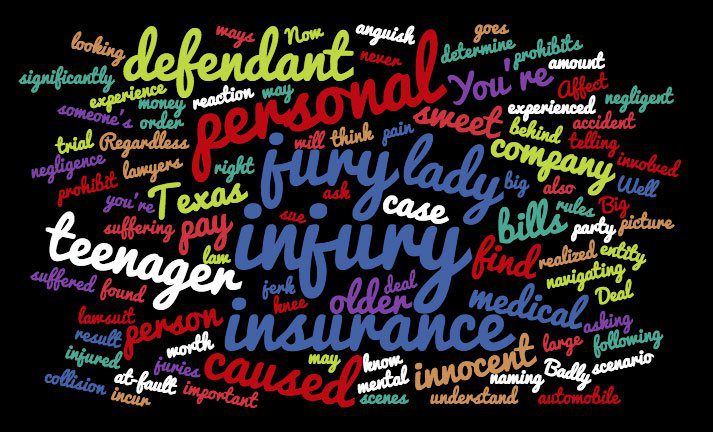Who do I sue after a car accident? This question can turn your world upside down.
You’re struggling to make sense of the wreckage, managing insurers and attempting to determine who is responsible. It’s overwhelming!
The reality is that understanding who to sue after a car accident, especially in states like Texas, can be as complex as navigating through an unfamiliar city without GPS.
If you don’t know how to handle this legally tricky situation, it could leave you stuck on the side of the road metaphorically speaking – stranded and frustrated.
Understanding Texas Personal Injury Laws
Texas, the Lone Star State, has its unique set of personal injury laws.
If you’ve experienced an injury due to another’s carelessness in Texas, there are certain regulations about who you can bring a legal action against.
Why Can’t I Sue The Insurance Company Directly?
The law prohibits suing an insurance company directly in Texas. It makes it clear that only the person or entity responsible for your injuries can be sued.
How Does This Impact My Case?
This rule significantly impacts how cases are presented and perceived by juries.
The jury isn’t allowed to know if the at-fault party had insurance.
This means they might assume that any damages awarded will come out of pocket from potentially sympathetic defendants.
In our next section, we’ll delve into navigating through these legal restrictions effectively. It may seem daunting initially but remember – most juries understand there is an insurance policy involved behind-the-scenes even though they’re not explicitly told so.
Navigating Through Legal Restrictions
Understanding the legal landscape is crucial when pursuing a personal injury case in Texas.
The law prohibits you from directly suing an insurance company, but experienced lawyers know how to work around these restrictions effectively.
Why Can’t I Sue The Insurance Company Directly?
Texas isn’t a direct action state.
This means that victims can’t sue at-fault parties’ insurers directly after auto accidents.
How Does This Impact My Case?
You may believe this limitation diminishes your opportunities for obtaining reasonable recompense, yet there is more to it than what initially meets the eye.
Strategies Used By Experienced Lawyers
- An effective strategy involves presenting solid evidence about negligence and damages incurred due to the accident. It helps sway jury opinion towards awarding rightful compensation despite not knowing about any existing insurance coverage.
- Jury Perception And Its Role: Despite being unaware of involved insurances, most juries understand their role – ensuring justice prevails regardless of defendants’ financial status or appearance.
Dealing With Uncooperative Auto Insurance Companies
We’ve all been there.
Attempting to rebound from a car crash, yet the insurance agency appears more like an obstacle than an assistance.
Common Frustrations With Auto Insurance Companies
Frequent issues include lowball settlement offers or denials of legitimate claims.
Nolo’s legal guide on dealing with insurers post-accident, highlights these common frustrations well.
Setting Realistic Expectations
The truth is, you can’t directly sue the insurer in Texas. It’s not about being difficult; it’s just how Texas law works when it comes to personal injury cases arising from car accidents.
But here’s something important: knowing this fact allows us to strategize effectively.
We understand that going against big corporations may seem daunting but remember – David did beat Goliath.
What implications does this have for your situation? Let’s delve into some different laws across states in our next section.
Exploring “Direct Action States”
If you’ve ever pondered why laws for personal injuries differ from state to state, it’s due to the various legislative regimes each one has.
What Are Direct Action States?
In contrast to Texas, some states in America are referred to as Direct Action states.
This term is used for jurisdictions where claimants can directly file a lawsuit against an insurance company without first suing the at-fault party.
- Louisiana: This southern state allows direct action against insurers in certain circumstances.
- New Jersey and Wisconsin: These two northern neighbors also permit direct lawsuits against insurance companies when dealing with automobile accidents or other personal injuries caused by negligence.
- Rhode Island and Nebraska: Both these states have specific statutes that allow victims to sue auto insurers directly after an accident has occurred due to another’s fault.
These variations underscore how important it is for individuals involved in car accidents or other incidents resulting from someone else’s negligence to understand their rights within their respective jurisdiction.
Remember though – no matter what type of legal system your state follows, seeking professional advice from experienced lawyers like Stoy Law Group, PLLC should always be your first step post any incident causing harm.
Understanding Your Rights as A Claimant
As a claimant, it’s essential to be aware of your rights when you have sustained an injury from someone else’s negligence in an auto accident or other personal injury.
You are a third-party beneficiary on the at-fault party’s insurance policy.
Your Rights As A Third Party Beneficiary To An Insurance Policy
This might sound complex but essentially, being a third-party beneficiary means that you have certain rights under the contract between the insured (the person who caused your injuries) and their insurer.
Note:
- An insurance policy is technically considered as a contract between two parties: The Insured and Insurer. You become part of this agreement when affected by actions covered within said contract.
- In Texas, once judgement has been entered against insured individuals after causing accidents, claimants can sue insurers directly – albeit only then.
- Filing claims doesn’t guarantee payment; insurers may dispute liability based upon various factors including potential contributory negligence from claimants themselves. It becomes vital therefore having experienced legal counsel guiding through such complexities effectively ensuring justice prevails ultimately.
Navigating these intricacies requires expertise. That’s where hiring seasoned personal injury lawyers like Stoy Law Group, PLLC comes into play.
Importance Of Hiring An Experienced Personal Injury Lawyer
Hiring an experienced personal injury lawyer can be the key to a successful case.
Why?
Their Expertise is Invaluable
An expert personal injury attorney at Stoy Law Group, PLLC, has a deep understanding of Texas law and how it applies to your situation.
Negotiating with Insurance Companies
A seasoned lawyer knows how to effectively negotiate with insurance companies for fair compensation on behalf of their clients.
Fighting For Your Rights in Court
If necessary, they will fight vigorously for you in court against those responsible for causing harm or loss due to negligence.
Paperwork & Legal Procedures
It’s clear that hiring an experienced personal injury lawyer like those at Stoy Law Group, PLLC provides invaluable support during such challenging times.
Remember – when justice matters most, having someone who understands the intricacies of law by your side can be game-changing.
FAQs in Relation to Who Do I Sue after a Car accident
How much can someone sue for a car accident in Florida?
In Florida, there’s no cap on damages for personal injury lawsuits. The amount depends on the severity of injuries and losses incurred.
What to do if someone sues you for a car accident in Texas?
If sued after a car accident in Texas, immediately contact your insurance company and an experienced attorney to guide you through the legal process.
Can a car owner be sued for another driver’s accident Alabama?
Yes, under certain circumstances such as negligent entrustment or if the driver is employed by the vehicle owner, they can be held liable in Alabama.
What is the no-fault law in Florida?
In Florida, the no-fault law requires drivers to carry Personal Injury Protection coverage. This means each driver’s own insurance covers their injuries regardless of who caused the accident.
Conclusion
Understanding Texas personal injury laws is the first step. It’s about knowing who to hold accountable after a car accident.
Navigating legal restrictions can be daunting, but not impossible with experienced lawyers by your side.
Dealing with uncooperative auto insurance companies? Frustrating, yes. But remember, you’re suing the negligent party and not their insurer directly.
“Direct action states” may allow for different approaches. In Texas, however, we have our own regulations to observe.
Your rights as a claimant are important too. You’re technically considered a third-party beneficiary on an at-fault party’s policy contract.
If all this seems overwhelming or confusing – don’t worry! At Stoy Law Group, we specialize in personal injury cases like yours and are ready to fight for justice on your behalf.
Let us take the legal burden off your shoulders so you can focus on healing. Reach out today and let us help you navigate through these challenging times. Your journey towards justice starts here!
Â














